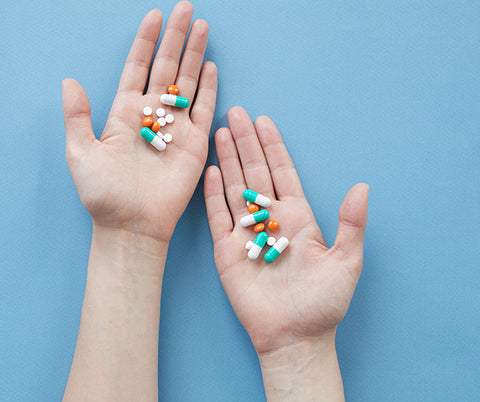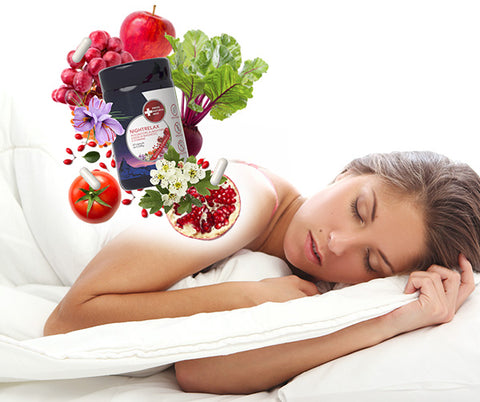If you've come here, it's because you've asked yourself this question at least once in your life: are food supplements harmful?
For such an important question, which torments many (especially mothers) , a specific analysis is needed , otherwise the only quick answer we can give you is: it depends .
An often overlooked concept is that relating to the composition of food supplements : any substance, natural or synthetic, introduced into our organism for food or non-food purposes, can be responsible for nutritional, biological and pharmacological effects, regardless of the purpose for which it is taken .
This concept applies to the vitamins present in vegetables as well as to water, to the proteins in meat , as well as to the flavonoids present in fruit and flowers and to the isoflavones in some legumes: they are all substances with a particular, and sometimes complex, chemical structure.
So, even “natural” products contain chemicals, which are therefore called phytochemicals .

Associations between plants
Another consideration to make is the number of plants present in a formulation.
There are even preparations with 60 components (in the sense of 60 herbs)!
It is obvious that, as the number of plants increases, the risks of adverse events and interactions also increase, which often become unpredictable for this reason alone.

Each single plant already has a mixture of substances , not tens, not hundreds, but thousands of very different substances with characteristics and properties peculiar to each of them.
In the traditional medicine of every population (European, Indian, Chinese, etc.) we commonly find the use of mixtures of herbs used for decoctions, pills or whatever, often even numerous, with the hope (more than the certainty) that they are synergistic with each other.
In some rare cases this is also demonstrated by scientific literature, and therefore it is a positive and exploitable event. But this is not always the case.
Much more often, we resort to mixtures of several herbs or extracts, even in the same preparation, only because it is recommended by tradition.
From the Italian experience at the Istituto Superiore di Sanità, out of over 230 reports received, an important fact emerges: in three quarters of the adverse reactions from herbs that were reported, the product involved more than one plant (up to over 60 plants!).
As the number of plants increases, even if the quantity of individual constituents present in a product decreases, thus reducing the potential effectiveness of that product , the risk of allergic reactions or interactions on the contrary increases.
Quality and safety
Naturally, increasing the number of plants used or the number of extracts also increases the risk of incompatibility and interactions.
The quality of raw materials, whether they are herbal drugs for herbal teas or extracts for pharmaceutical preparations or supplements, must meet safety and quality criteria , otherwise the risk factors of side effects, interactions or allergic reactions increase dramatically.
It is therefore essential to ensure the absence of:
- adulterations (for example: Ilicium religiosum instead of Illiciumerum, Aristolochia fangji instead of Stephania tetrandra)
- adulterations with synthetic drugs (for example: cortisone, NSAIDs, diuretics, paracetamol, benzodiazepines, estrogens, etc.)
- bacterial contamination
- insects, parasites
- bacterial toxins, mycotoxins
- phytosanitary products, pesticides, insecticides, fungicides, herbicides
- heavy metals (arsenic, mercury, lead, cadmium, etc.)
- radioactivity
- solvents

So, are food supplements bad?
Coming back to us, it happens very often, therefore, that the parents of a child who starts taking protein powder or amino acid tablets may worry about the safety and health implications.
In reality the causes of these concerns can be multiple, but they can be summarised in two large groups :
- On the one hand, the preconceptions towards a form of food that looks much more like a medicine
- On the other hand, the lack of knowledge related to that specific supplement
However, what helps us to answer our question, "are food supplements harmful?" are the myriads of scientific studies on the integration of amino acids and proteins with the aim of improving health and in particular with the aim of:
- Maintain immune function
- Promote weight loss
- Curbing Muscle Mass Loss in Older Age
- Promote muscle mass growth
- Keeping diabetes under control

These studies also focused on the quality of these supplements and all converge on one common point, if amino acid and protein supplements are used regularly and must not be formulated with artificial flavors, artificial colors or artificial sweeteners , only with excellent raw materials and with as few excipients as possible, then it is possible to exploit all their effectiveness in complete safety .
In conclusion, are food supplements harmful?
So are food supplements bad? No, if formulated with consumer safety first and not profits , as we have seen a good supplement must contain raw materials of the highest quality, free of flavors, colors, artificial sweeteners and all the interactions of the active ingredients that make up the formulation must be tested.
We at Swiss Natural Med strictly adhere to Swiss legislation on foodstuffs , but unfortunately many, in order to participate in the fight for the lowest prices (especially companies that sell online) decide to use reckless and reckless strategies.
Sometimes low prices make us underestimate the potential risks of an unguaranteed purchase : on the web, in fact, you can find products from all over the world, even from countries with different legislation than Switzerland, Italy and the EU.
Furthermore, many sites that offer food supplements for sale completely escape controls, with potential health risks.
In the absence of precise controls, just like any other food, cosmetic or pharmaceutical product, food supplements may also contain substances and quantities different from those declared, or even harmful substances .
For the safety of our customers, we use the HACCP (Hazard Analysis and Critical Control Points) system, a tool capable of guaranteeing a higher level of food safety, with rational and organised control systems.

Furthermore, we rely on the consultancy of external companies such as BioAcor, Swiss Quality Testing & Consulting for everything concerning compliance with the Cantonal ordinances on foodstuffs.
In this way we can guarantee the highest level of safety in terms of traceability, raw materials, formulations, containers, labelling, transport and storage of our products .
The advice we want to give you is to choose supplements paying more attention to the quality of the raw materials and the production processes they are carried out .
Do you want to know how to take food supplements correctly?
Access our online nutritional test now to receive specific nutritional advice and a personalized meal plan that will help you live a healthy life.
Take control of your life and adopt a proactive approach to health and nutrition.
GO TO THE NUTRITIONAL TESTIn short, are food supplements harmful?
The debate over the safety of dietary supplements is a complex issue, and the answer to the question "Are dietary supplements harmful?" depends on many factors.
It is essential to consider the composition of these products, since any substance, whether natural or synthetic, can have nutritional, biological and pharmacological effects in our body, regardless of the purpose of their use.
For example, plants contain natural chemicals, known as phytochemicals, and some formulations may contain a wide variety of plants, increasing the risk of unwanted interactions.
Furthermore, the quality and safety of raw materials used in supplements are crucial, as contamination, impurities or low-quality ingredients can pose health risks.
In conclusion, dietary supplements are not harmful if they are formulated with high-quality ingredients and follow rigorous safety standards, but it is essential to be careful when choosing products and look for reliable brands that meet these standards.
Sources:
- Foods . 2020 Jun; 9(6): 750. doi: 10.3390/foods9060750
- J Food Sci Technol . 2015 Nov; 52(11): 6847–6858.doi: 10.1007/s13197-015-1894-0
- Adv Exp Med Biol. 2018; 1032:15–35. doi:10.1007/978-3-319-98788-0_2
- Nephrology 2008; https://doi.org/10.1111/j.1440-1797.2008.00940.x
- Review Expert Opin Drug Metab Toxicol. 201 7 Oct;13(10):1047-1062.doi:10.1080/17425255.2017.1378342.
- BMC Complement Altern Med. 2019 Jan 18;19(1):23.doi: 10.1186/s12906-019-2439-2.
- Eur J Drug Metab Pharmacokinet. 2016 Aug;41(4):339-44.doi: 10.1007/s13318-015-0263-8. Epub 2015 Feb 27.
- Eur J Drug Metab Pharmacokinet. 2017 Jun;42(3):397-405.doi: 10.1007/s13318-016-0352-3.
- Pharm Res. 2020 Jun 11;37(7):128.doi: 10.1007/s11095-020-02834-8.
- Anticancer Res. 2010 Mar;30(3):811-4.
The information has been extrapolated from recent “Pubmed” publications and from the treatise “Interactions between herbs, foods and drugs” Prof. Fabio Firenzuoli, professor of Clinical Phytotherapy at the University of Florence, directs the Natural Medicine Unit (S. Giuseppe Hospital in Empoli), Reference Centre for Phytotherapy, Tuscany Region, consultant for the Istituto Superiore di Sanità for the control of reactions



